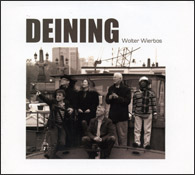Wolter Wierbos
Deining
(DolFijn Records)
From
the end of the 70s, trombonist Wolter Wierbos has played and recorded with
many different line-ups, including groups led by Ab Baars and Maarten Altena,
Alexander von Schlippenbach's Berlin Contemporary Jazz Orchestra, Frank
Gratkowski's Quartet, Gerry Hemingway's Quintet, and Misha Mengelberg's
Instant Composers Pool Orchestra. An excellent, versatile instrumentalist,
also a reluctant leader, Wierbos inaugurated his tiny independent label
releasing what, if I'm not mistaken, is his third solo album, the very
fine 3 Trombone Solos.
Recorded
live in July, 2006 at De Drie Gebroeders (which to me looks like a boat
floating on... a liquid of some sort) Deining sees Wierbos playing alongside
five musicians whom I assume to be quite known to readers, and obviously
to Wierbos: reed player Ab Baars, double bass player Wilbert de Joode,
viola player Mary Oliver, Han Bennink on "drums, etc.", and guitar
player Franky Douglas. For a moment or two, the photo appearing on the
cover fooled me into thinking the CD featured a sextet, but no: the album
only features various duets, which - once I overcame my initial sense of
surprise - was alright by me.
The
three duets with Franky Douglas show the guitarist offering pleasant-sounding
themes, a bit less ambitious than maybe is to be expected, given the circumstances,
but this is not necessarily a bad thing, since they show a (more thematic)
side of Wierbos that's not featured all that often; also because, functioning
as they do as a kind of intermission in the middle of more difficult-sounding
material, they work perfectly as such.
The
largest part (talking about time here) of the album is dedicated to some
very fine duos with Wilbert de Joode on double bass, whose language is
quite versatile, and whose timbre - quite dry-sounding, not at all "fat" -
always reminds me of an oversized cello. They go from a slow "loop"
to frantic climates, from swing played pizzicato to starts and stops that
are maybe pre-planned (but maybe aren't), to a swing-sounding melody. And
it's only in the course of the first of six tracks! Just a few highlights
from the following tracks: the pizzicati in the second track; the breathing
coupled with the harmonics played arco in the third track; the ultra-low
pedal and those cartoon voices in the fourth track; the long, changing dialogue
on track five; those mumblings on track six.
The
first duo with Douglas has a simple melody, the guitar playing arpeggios,
the trombone sounding almost like a cornet.
The
three duets with Ab Baars feature Baars on tenor, clarinet (strangely uncredited),
and no-kan. The first is a thematic track, the second a composition by
Mengelberg that sounds fresh and (not surprisingly) very Monk-like, with
the trombone in nice counterpoint work, while the third track sounds like
a kind of march, the very high, thin-sounding no-kan coupled to a very
low-sounding trombone.
The
following duo with Douglas has a start sounding almost like it's quoting
from Take Five, with samba accents.
As
expected, the duo with Han Bennink is frantic, there's the ride cymbal,
the trombone, playing tempo, there's a mouth harp. Then we have a meditative
trombone solo, a drum solo with fast brushes on the snare drum, then a
trombone and viola dialogue which very logically transports the listener
to a reprise of Mengelberg's theme, its melody being performed first by
the viola, then by Bennink's sopranino.
The
third duo with Douglas has a bossa flavour.
The
last track of the CD is another duo with de Joode: the double bass plays
a cadenza/"pulse" often acting almost like drums, the trombone
works around a theme in a jazz-like vein, and it's a fine track that ends
silently, with no audience applause.
Beppe Colli
© Beppe Colli 2009
CloudsandClocks.net | Oct. 10, 2009











